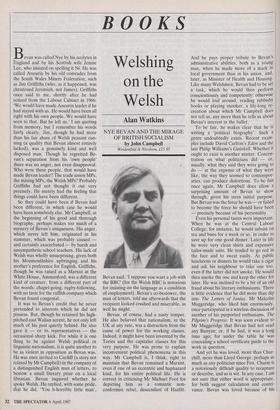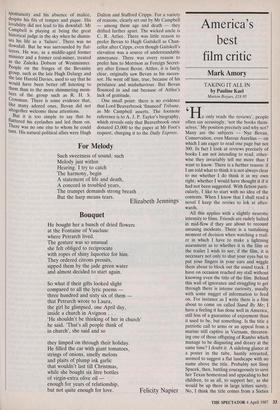BOOKS
Welshing on the Welsh
Alan Watkins
NYE BEVAN AND THE MIRAGE OF BRITISH SOCIALISM by John Campbell
Weidenfeld & Nicolson, £15.95
Bevan was called Nye by his acolytes in England and by his Scottish wife Jennie Lee, who insisted on spelling it Ni. He was called Aneurin by his old comrades from the South Wales Miners Federation, such as Jim Griffiths (who, as it happened, was christened Jeremiah, not James). Griffiths once said to me, shortly after he had retired from the Labour Cabinet in 1966: `We would have made Aneurin leader if he had stayed with us. He would have been all right with his own people. We would have seen to that. But he left us.' I am quoting from memory, but I remember his words fairly clearly. Jim, though he had more than his fair share of Welsh peasant cun- ning (a quality that Bevan almost entirely lacked), was a genuinely kind and well disposed man. Though he regretted Be- van's separation from his 'own people' there was no anger, not even disapproval. Who were these people, that would have made Bevan leader? The trade union MPs, the mining MPs, the Welsh MPs? Probably Griffiths had not thought it out very precisely. He merely had the feeling that things could have been different.
So they could have been if Bevan had been different, in which case he would have been somebody else. Mr Campbell, at the beginning of his good and thorough biography, perhaps makes too much of a mystery of Bevan's uniqueness. His anger, which never left him, originated in his stammer, which was probably caused and certainly exacerbated — by harsh and unsympathetic school teachers. His lack of Welsh was wholly unsurprising, given both his Monmouthshire upbringing and his mother's preference for English. Griffiths, though he was raised as a Marxist at the White House, Ammanford, was a different kind of creature, from a different part of the woods: chapel-going, rugby-following, with no taste for the raffish company which Bevan found congenial.
It was to Bevan's credit that he never pretended to interests which he did not possess. But, though he retained his high- pitched east Walian accent, he not only left much of his past quietly behind. He also gave it — or its representatives — the occasional sharp kick. For while it is one thing to be against Welsh political or linguistic nationalism, it is quite another to be as violent in opposition as Bevan was. He was once invited to Cardiff (a story not related by Mr Campbell) in the company of a distinguished English man of letters, to bestow a small literary prize on a local librarian. Bevan inquired whether he spoke Welsh. He replied, with some pride, that he did. 'You h-horrible little man', Bevan said. 'I suppose you want a job with the BBC' (for the Welsh BBC is notorious for insisting on the language as a condition of employment). Bevan's co-bestower, the man of letters, told me afterwards that the recipient looked crushed and miserable; as well he might.
Bevan, of course, had a nasty temper. He also believed that nationalism, in the UK at any rate, was a distraction from the cause of power for the working classes. Indeed, it might have been invented by the Tories and the capitalist classes for this very purpose. He was prone to explain inconvenient political phenomena in this way. Mr Campbell is, I think, right to maintain that Bevan remained a Marxist, even if one of an eccentric and haphazard kind, for his entire political life. He is correct in criticising Mr Michael Foot for depicting him as a romantic non- conformist rebel, descendant of Hazlitt. And he pays proper tribute to Bevan's administrative abilities, both as a young man, when he made more of a mark in local government than in his union, and, later, as Minister of Health and Housing. Like many Welshmen, Bevan had to be set a task, which he would then perform conscientiously and competently: otherwise he would loaf around, reading rubbishy books or playing snooker, a life-long re- creation about which Mr Campbell does not tell us, any more than he tells us about Bevan's interest in the ballet.
To be fair, he makes clear that he is writing a 'political biography'. Such a genre undoubtedly exists. Recent exam- ples include David Carlton's Eden and the late Philip Williams's Gaitskell. Whether it ought to exist is another matter. Concen- tration on what politicians did — or, usually, what they said they were going to do — at the expense of what they were like, the way they seemed to contempor- aries, can produce distortions. To be fair once again, Mr Campbell does allow a surprising amount of Bevan to show through, given his stern initial purpose. But Bevan was the force he was — or failed to become the force he should have been — precisely because of his personality.
Even his personal tastes were important. When he was at the Central Labour College, for instance, he would subsist on tea and buns for a week or so, in order to save up for one good dinner. Later in life he wore very clean shirts and expensive tailor-made suits. He tended to go red in the face and to sweat easily. At public luncheons or dinners he would take a cigar and ask his neighbour to take one too, even if the latter did not smoke. He would then smoke the one and keep the other for later. He was inclined to be a bit of an old fraud about his literary enthusiasms. There is little evidence that he did more than dip into The Letters of Junius. Mr Malcolm Muggeridge, who liked him enormously, once participated in a wireless discussion of another of his purported enthusiams, The Pilgrim's Progress. It was soon evident to Mr Muggeridge that Bevan had not read any Bunyan; or, if he had, it was a long time ago; for under the table he was concealing a school certificate guide to the work in question.
And yet he was loved, more than Chur- chill, more than Lloyd George, perhaps as much as any politician since Fox. Charm is a notoriously difficult quality to recapture or describe, and so is wit. In any case, I am not sure that either word is appropriate, for both suggest calculation and contri- vance. Bevan was loved because of his spontaneity and his absence of malice, despite his fits of temper and pique. His lovability did not lead to his downfall: Mr Campbell is playing at being the great historical judge in the sky when he dismis- ses his life as a 'failure'. There was no downfall. But he was surrounded by flat- terers. He was, as a middle-aged former minister and a former coal-miner, treated as the Zuleika Dobson of Westminster. People on the fringes of the Bevanite group, such as the late Hugh Delargy and the late Harold Davies, used to say that he would have been better off listening to them than to the more shimmering mem- bers of the group such as R. H. S. Crossman. There is some evidence that, like many adored ones, Bevan did not altogether welcome these attentions.
But it is too simple to say that he fluttered his eyelashes and led them on. There was no one else to whom he could tarn. His natural political allies were Hugh Dalton and Stafford Cripps. For a variety of reasons, clearly set out by Mr Campbell — among them age and death — they drifted further apart. The wicked uncle is C. R. Attlee. There was little reason to prefer Bevan to Hugh Gaitskell as Chan- cellor after Cripps, even though Gaitskell's elevation was a source of understandable annoyance. There was every reason to prefer him to Morrison as Foreign Secret- ary after Ernest Bevin. Attlee, it is fairly clear, originally saw Bevan as his succes- sor. He went off him, true, because of his petulance and misbehaviour. But Bevan flounced in and out because of Attlee's lack of gratitude.
One small point: there is no evidence that Lord Beaverbrook 'financed' Tribune, as Mr Campbell asserts. The footnote reference is to A. J. P. Taylor's biography, which reveals only that Beaverbrook once donated £3,000 to the paper at Mr Foot's request, charging it to the Daily Express.



























































 Previous page
Previous page